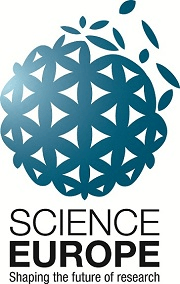Science Europe
| Science Europe | |
|---|---|
 | |
| Motto | Shaping the future of research |
| Formation | October 2011 |
| Type | NGO |
| Purpose/focus | Research |
| Website | www.scienceeurope.org |
Science Europe is an association of major European Research and Research Funding Organisations (RFO) and Research Performing Organisations (RPO).[1] It was established in October 2011 and is based in Brussels. Science Europe currently represents 51 member organisations.[2]
The association facilitates co-operation amongst its members and supports excellence in science and research in all disciplines, acting as a platform to develop positions on research policy issues and to address policy messages to European institutions, researchers, national governments, and the public.
Science Europe is actively involved in the development of the European Research Area (ERA).[3] With the ongoing development of the ERA, and increased collaboration between research organisations in undertaking and planning research, co-ordination at the policy level is essential. Prior to the establishment of Science Europe, many of its members were collaborating through the European Heads of Research Councils (EUROHORCs)[4] and the European Science Foundation (ESF).[5] EUROHORCs officially dissolved immediately before the Science Europe Founding Assembly, and some of the policy-related functions previously carried out by ESF were taken up by Science Europe.
The policy-related work of Science Europe is guided by the Science Europe Roadmap. This document outlines the strategic objectives for Science Europe, as well as nine Priority Action Areas in which Member Organisations will collaborate.
Areas of activity
Science Europe carries out advocacy and policy activities in a variety of research policy areas, including:
- Cross-border Collaboration
- Ex-post Evaluation and Impact of Research
- Gender and Diversity
- Open Access to Scientific Publications
- Open Access to Research Data
- Research Infrastructures
- Research Careers
- Research Integrity
Dedicated working groups are set up around these policy areas to make concrete progress on finding common approaches; these working groups draw on the extensive experience of the member organisations.
Scientific Committees
Science Europe is supported by six scientific committees. These committees, each composed of 15 members including the Chair, act as the voice of researchers to Science Europe and are essential for the provision of scientific evidence to support science policy and strategy developments at pan-European and global level.
The committees cover:[6]
- Humanities
- Social Sciences
- Life
- Environmental and Geo Sciences
- Medical Sciences
- Physical
- Chemical and Mathematical Sciences
- Engineering
The committees play a dual role: they provide input into the work that Science Europe and its member organisations carry out to develop the ERA [7] and they provide independent scientific advice and input to science policy and research developments, by offering strategic vision and guidance and by horizon scanning, within and across disciplines.
References
- ↑ "Member Organisations". scienceeurope.org. Retrieved 17 June 2013.
- ↑ "HORIZON 2020 – Supporting science". Pan European Networks. 12 March 2013. Retrieved 18 June 2013.
- ↑ Friedrich, Thomas (17 July 2012). "European Researchers Strive for a New ERA". American Association for the Advancement of Science. Retrieved 18 June 2013.
- ↑ "The European Heads of Research Councils". EUROHORCS. Retrieved 18 JUne 2013.
- ↑ "European Science Foundation". Retrieved 18 June 2013.
- ↑ "The Scientific Committees". scienceeurope.org. Retrieved 18 June 2013.
- ↑ "Science Europe Statement on the European Research Area" (PDF). Europa. 17 July 2012. Retrieved 18 June 2013.